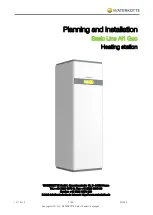
Rev 10.1/8-20
9
PF-89DCO-DVS: #35132
OPERATION
B
EFORE
U
SING THE
L
IFTER
The operator must determine whether the lifter is capable of performing each intended task, in
accordance with the SPECIFICATIONS and INTENDED USE sections of this
INSTRUCTIONS
manual. In addition, all of the following preparations must be completed prior to lifting any
load.
Taking Safety Precautions
The operator must be trained in all relevant industry and regulatory standards for the operation
of the vacuum lifter in its geographical location (eg, ASME B30.20 in the USA).
The operator must read and understand this
INSTRUCTIONS manual, including all WARNINGS,
before using the lifter. If necessary, contact Wood’s Powr-Grip or an authorized dealer for
assistance.
WARNING: Always wear appropriate personal protective equipment.
The operator must wear any personal protective equipment and take any other precautions
required to handle the load safely. Consult appropriate trade association guidelines to
determine what precautions are necessary for each type of load material.
Performing Inspections and Tests
WARNING: Always check battery energy before using lifter.
(See MAINTENANCE: B
ATTERY
T
EST
)
Perform all inspections and tests required by the I
NSPECTION
and T
ESTING
S
CHEDULES
(see MAINTENANCE). In addition, if the lifter has been in
storage, always conduct a V
ACUUM
T
EST
before placing it in service (see
MAINTENANCE).
WARNING: Make sure alarm is clearly audible over ambient noise at operator
position.
The volume of the alarm may be adjusted by rotating the shutter of the low vacuum warning
buzzer. Make sure the alarm is loud enough to be heard over any other noise that may be
present while the lifter is in use. In addition, the alarm must be clearly audible at the maximum
distance the operator may be from the lifter, as well as through any barriers or obstructions
between the operator and the lifter.
3
3
Maximum buzzer volume is 103 dBA at 2 ft [60 cm]. Consult EN 7731 to make sure the warning buzzer complies with CE
Standards.
Summary of Contents for PFHL89DCO
Page 2: ......
Page 32: ...Rev 10 1 8 20 30 PF 89DCO DVS 35132 ...












































